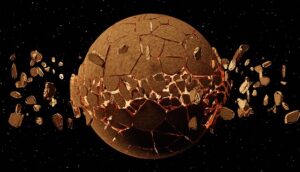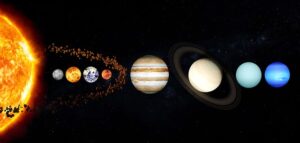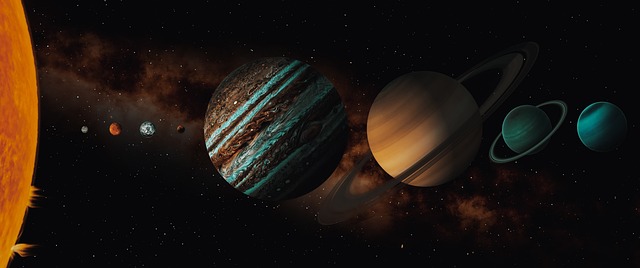Lets first know lil more about Jupiter, Jupiter is the fifth planet from the Sun and the largest planet in the Solar System. It is a gas giant with a mass 1000th that of the Sun, but 2.5x times that of all other planets in the Solar System. Jupiter has a strong internal heat source and its atmosphere is composed primarily of hydrogen with small amounts of helium, methane, ammonia, and water vapor. It has at least 79 known moons, including the four large Galilean moons discovered by Galileo Galilei in 1610: Io, Europa, Ganymede, and Callisto. Jupiter has a long history of observations and was known by many ancient cultures. Also the Jupiter name came from king of the gods in Roman mythology.
Jupiter is failed star?
Jupiter is not considered as a failed star, but it is sometimes referred to as a “failed star” because it is similar in some ways to a star and has a composition that is more similar to a star than a planet. Jupiter is a gas giant and is composed primarily of hydrogen and helium, which are the same elements that make up the majority of the Sun’s composition. The process of nuclear fusion, which powers stars, could not occur in Jupiter due to the planet’s relatively low mass. Jupiter also lacks the intense pressure and heat at its core that are necessary to sustain nuclear fusion. Instead, Jupiter generates internal heat through a process called “Hot fusion” or “deuterium fusion” which occurs when deuterium and tritium nuclei fuse together, releasing energy.
In terms of size, Jupiter is not large enough to be classified as a star, stars need to be at least 8% the mass of the sun to sustain hydrogen fusion, Jupiter is only 0.1% the mass of the sun, so it is not massive enough to become a star.
So, while Jupiter shares some similarities with a star, it is still considered a planet and a failed star in lame way.
Jupiter is solid or hollow planet?
Jupiter is not a solid planet like Earth, it’s a gas giant. The outer atmosphere of Jupiter is composed mainly of hydrogen (about 89%) and helium (about 11%), with small amounts of other gases such as methane, ammonia, and water vapor. Jupiter’s atmosphere is extremely dense and hot, with temperatures reaching as high as 20,000 degrees Celsius (36,000 degrees Fahrenheit) near the core.
Beneath the atmosphere, Jupiter has a layer of liquid metallic hydrogen. This layer is thought to be about 1000 kilometers (620 miles) thick and is composed of hydrogen atoms that are so compressed and heated that they have become a metal.
Further down, at a depth of about 1000 kilometers, the pressure and temperature are high enough to compress hydrogen into a liquid-like state, however, it’s not a liquid as we know it, it’s called a metallic liquid or a liquid metal, due to the high pressure and temperature.
At the very center of Jupiter, there is a small, rocky core made up of heavier elements such as carbon and oxygen. The size of the core is estimated to be about the size of Earth, but much denser.
Another fact is Humans cannot travel to Jupiter, as it is not possible for humans to stand on Jupiter. Jupiter is a gas giant, not a solid planet like Earth. The surface of Jupiter is not a solid surface that one could stand on, rather it is the top of an extremely thick atmosphere made mostly of hydrogen and helium.

What is cold fusion inside Jupiter?
Inside Jupiter, like all the gas giant planets, there is immense pressure and temperature. At the core of Jupiter, the pressure can reach several hundred times that at the Earth’s surface and temperatures can reach tens of thousands of degrees Celsius. Under these conditions, it is thought that “hot fusion” reactions can take place, where hydrogen isotopes fuse together to form helium, releasing a large amount of energy in the process. This process is similar to the one that occurs in the sun and other stars, where hydrogen atoms are fused together to form helium, releasing energy in the form of light and heat.
Deuterium fusion, also known as D-D fusion is a type of hot fusion reaction that occurs between the isotopes of hydrogen called deuterium. Deuterium is a stable isotope of hydrogen with one proton and one neutron in its nucleus, and it’s found in small amounts in natural water. D-D fusion is less energetic than the fusion of hydrogen isotope, tritium, with deuterium, which is called D-T fusion.
It is thought that inside Jupiter, the intense pressure and temperature at the core allows for deuterium and tritium to fuse together, releasing a large amount of energy in the process, which helps to heat the planet and maintain its large size. This process is similar to the “hot fusion” reactions that take place in the sun and other stars, where hydrogen atoms are fused together to form helium, releasing energy in the form of light and heat.
It is important to note that while scientists believe that hot fusion reactions are taking place inside Jupiter, it is still a topic of ongoing research, and the details of how these reactions occur within Jupiter are not fully understood.
Will Jupiter leave solar system in future?
Jupiter, as well as all the other planets in the Solar System, are in orbit around the Sun. The orbit of Jupiter is determined by the balance of the gravitational force exerted on it by the Sun and its own motion. Jupiter’s orbit is an ellipse, meaning that its distance from the Sun varies over the course of its orbit. The average distance of Jupiter from the Sun is about 778 million kilometers (484 million miles).
Jupiter, like all the other planets in the Solar System, is also affected by the gravity of other objects in the Solar System, such as the other planets and the Sun’s gravity. These gravitational forces keep all the planets, including Jupiter, in their orbits around the Sun.
It is extremely unlikely that Jupiter will go out of the solar system because it’s in a stable orbit and the gravitational pull from the sun and other planets will keep it bound to the solar system. Even if there were some external force acting on Jupiter, it would take an enormous amount of energy to overcome the gravitational pull of the Sun and propel Jupiter out of the Solar System.
It’s important to note that the solar system itself is moving through space and eventually it will leave the current location of the sun, however, the planets will still stay bound to the sun and will continue to orbit it.

Jupiter is “the vacuum cleaner of solar system”? an indirect saviour of earth
Jupiter is often referred to as a “gravitational shield” for the inner planets, including Earth, because of its massive size and gravity. Its gravity helps to keep asteroids and comets from colliding with the inner planets, by attracting them towards itself.
Jupiter’s “gravitational belt” also helps to keep the asteroid belt between Mars and Jupiter, preventing the asteroids from colliding with the inner planets. Some studies have suggested that Jupiter’s gravity may have played a role in shaping the early solar system, by influencing the orbits of the inner planets and helping to protect them from collisions with other celestial bodies.
Jupiter also acts as a “vaccuum cleaner” by attracting comets and asteroids that would otherwise collide with Earth, this is why scientists suggest that Jupiter’s gravity has played a key role in keeping the Earth safe from catastrophic impacts over the course of its history.
It’s important to note that Jupiter does not have a direct role in maintaining Earth’s climate or atmosphere.
Importance of Jupiter planet in mythology.
In Roman mythology, Jupiter is the king of the gods and god of the sky and thunder. He is the equivalent of the Greek god Zeus. Jupiter was considered the most powerful of all the gods and was often depicted holding a thunderbolt. He was also considered the protector of the Roman state and its laws, as well as the guardian of the Roman people.
In many ancient cultures, Jupiter was also considered a planet of good fortune and was often associated with wealth, power, and success. It was also believed to have a strong influence over the lives of individuals and was often consulted for guidance and protection.
In astrology, Jupiter is considered a benefic planet and is associated with growth, expansion, and good luck. It is said to govern long-distance and foreign travel, higher education, and the law. It is also associated with the principles of optimism and generosity.
In addition to its cultural and astrological importance, Jupiter is also a key planet in the study of astronomy and cosmology. Its large size and strong magnetic field make it a fascinating subject for scientific research and it has been studied extensively by astronomers and space missions such as the Galileo and Juno missions.
Finally, few takeaways about Jupiter…
Jupiter is the largest planet in our solar system and plays a number of important roles in the dynamics of the solar system.
First, Jupiter acts as a “gravitational shield” for the inner planets, including Earth, by attracting asteroids and comets towards itself and keeping them from colliding with the inner planets. Its gravity also helps to keep the asteroid belt between Mars and Jupiter, preventing the asteroids from colliding with the inner planets.
Second, Jupiter’s gravity plays a key role in the orbits of the other planets in the solar system, influencing their motions and keeping them in stable orbits.
Third, Jupiter has a strong magnetic field and intense radiation belts, which can affect the environment of other planets and moons in the solar system.
Fourth, Jupiter has many moons, some of which have the potential to host life and others that have been proposed as potential destinations for manned missions.
Finally, Jupiter has unique atmosphere, with colorful clouds and storms, like the Great Red Spot. It’s also an important object in the study of planetary formation and evolution, as it is thought to have formed early in the solar system’s history, and may have played a role in shaping the early solar system.
